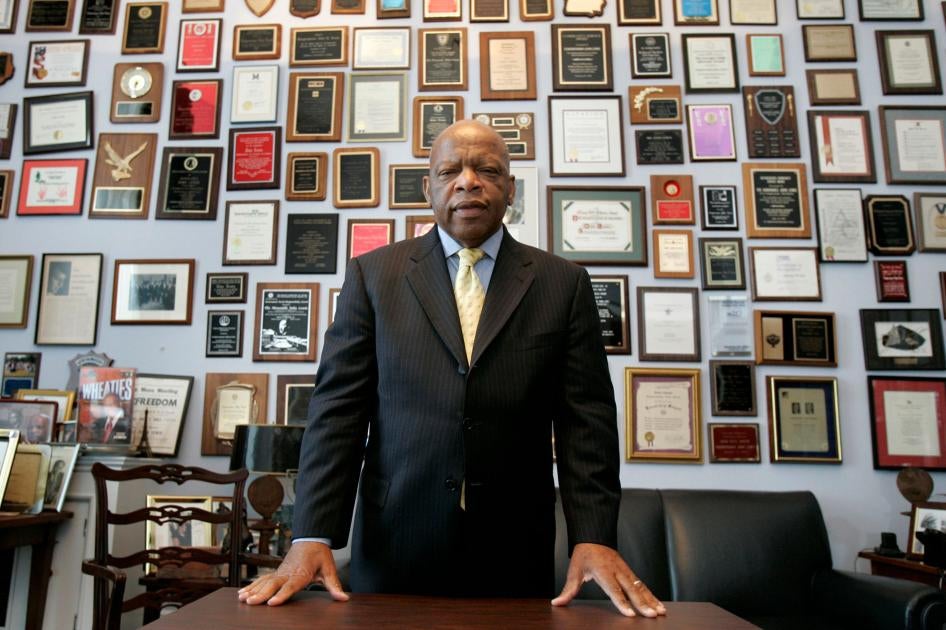A friend once advised me to never meet my heroes because it would always disappoint. She never met Congressman John Lewis.
John Lewis was more than an icon or someone that I read about in books. I was a young, Black woman who grew up in public housing with dreams of becoming a civil rights lawyer, and John Lewis' journey was the template for the walk I hoped to take.
I prayed that I would have just one iota of his courage when slaying my own dragons of injustice. And I knew they would pale in comparison to anything he had faced.
In my early years of practicing law, I was determined, somehow, to meet him and get a piece of wisdom that I could keep throughout my career. Like so many whose lives he touched, I got so much more.
I had just finished reading Congressman Lewis' 1999 memoir, "Walking with the Wind" and I learned that a partner at my firm knew him. So, I marched into his office, and told him that the congressman was one of my heroes and I had to find a way to meet him. He graciously agreed to help arrange it.
Stepping into Mr. Lewis' congressional office was like walking into a museum of civil rights history. As I waited nervously, my eyes grew tired attempting to take it all in.
When he walked in, I was overcome with awe and humility because to me he was civil rights royalty. Those feelings quickly subsided because Mr. Lewis had a way of putting you at ease and making you feel like nothing was more important at that moment than sitting and talking with you. And that is just what we did.
There was no question too small or obvious for him to answer. He gave me more time than anyone of his stature would have been expected to allow and I savored every story, every parable and every lesson he shared.
It was his response to my last question that stuck and continues to guide me to this day. When I asked him how young people could ascend to leadership roles when seasoned leaders are unwilling to teach and mentor, he stiffened his back and without missing a beat told me: We didn't ask permission to move into leadership, we took it.
I see that today with the young warriors taking to the streets and demanding an end to systemic racism and injustice in the United States and around the globe.
Years later, when I led the Washington, DC, office of the Brennan Center for Justice, my work on voting rights and racial justice placed me squarely in Mr. Lewis' orbit. On one occasion, I had the honor of sharing the stage with him to discuss barriers to voting.
To my amazement, he approached me afterward and invited me to join him and his congressional delegation on that year's annual pilgrimage to Selma, Alabama, to commemorate "Bloody Sunday" -- where in 1965 a trooper fractured Lewis' skull with a baton -- and the march for voting rights.
Over a three-day journey, I found myself at the schoolhouse door at the University of Alabama, where former Gov. George Wallace stood to try to block the entry of two Black students in 1963; walking through the doors of the 16th Street Baptist Church in Birmingham where, in 1965, four little Black girls were killed in a Klan bombing; and sitting in the Alabama Capitol Building as the then-governor apologized for the ugly history that brought Mr. Lewis and his delegation back to Selma every March.
I saw and understood the walk Mr. Lewis took in his life and what real courage and perseverance looked like up close. My life was forever changed by walking on the hallowed Southern soil where blood was shed, and lives were lost, all in the name of freedom.
I worked with Mr. Lewis and his staff on several occasions. Each time I had the privilege of being in his presence, I was reminded that the work and the walk is not about any of us individually, but about our belief in the idea that everyone deserves justice regardless of race, color, religion, ability, sexual orientation or gender identity.
Now that I work at Human Rights Watch, I continually revisit lessons learned from him -- including that human rights and civil rights are inextricably linked. As he noted recently, "I have been in some kind of fight -- for freedom, equality, basic human rights -- for nearly my entire life."
When Mr. Lewis was arrested in Washington for demonstrating against apartheid at the South African embassy and outside Sudan's embassy for protesting genocide in Darfur, he underscored this connection and showed us all that the fight for rights is global.
As I grapple with the fact that Mr. Lewis' life has ended, it is this belief that I will hold tightly through tears and heartache. In this moment of reckoning with racial injustice, not just in the United States, but around the world, that belief can and must sustain every marcher, protester and justice-seeker.
I recall my friend's warning and relish knowing firsthand that Mr. Lewis was a real, living and breathing hero.







